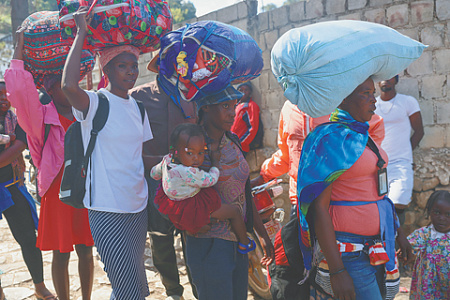
Donald Trump has decided to return to one of the most criticized practices in the world of his first term as president – the ban on entry to the United States for citizens of countries where, according to the White House, it is not possible to properly check applicants for American visas. A total of 19 countries were blacklisted. Most of them are African.
As of Monday, June 9, the issuance of any American visas to citizens of Afghanistan, Chad, Eritrea, Myanmar, the Republic of the Congo, Equatorial Guinea, Iran, Libya, Sudan, Yemen, Somalia and Haiti will cease. For citizens of Burundi, Sierra Leone, Togo, Laos, Cuba, Venezuela and the only former Soviet republic on this list, Turkmenistan, visa requirements will be greatly tightened. We can say that the United States is now closed to these seven. For example, citizens of Turkmenistan will not be issued visas of categories B-1 (visiting for business purposes), B-2 (tourist, medical and personal purposes), B-1/B-2, F (for students wishing to study at American universities), M (for students wishing to study at non-academic institutions educational institutions) and J (for participants in student and scientific exchange programs). In essence, Turkmens will be able to enter the United States either in transit, or as investors, or as family members of an American citizen. There is, of course, the option of obtaining a work visa at the request of an American employer, but given the drastic tightening of migration policy, it looks like something out of the realm of fantasy for citizens of blacklisted countries.
Trump’s decree provides justifications for each of the countries. The main reason for being blacklisted is the high percentage of illegal migrants. However, some countries are blamed for the lack of a “competent and cooperative body” responsible for issuing visas. Curiously, the justifications given in the decree did not coincide at all with the reason that prompted the revival of the practice of blacklisting visas, which was voiced by Trump himself. He said that the closure of the United States to people from a number of countries is a reaction to the crime in Boulder, Colorado. On June 2, molotov cocktails were thrown at participants of a pro-Israel demonstration. The perpetrator of the crime was detained. He turned out to be a native of Egypt, a country that was not blacklisted.
In essence, Trump has returned to the practice of his first presidential term (2017-2021), which was mercilessly criticized by Democrats. However, then he imposed a ban on entry to the United States for citizens of only nine countries: Cuba, Iran, Libya, North Korea, Somalia, Syria, Sudan, Venezuela and Yemen. In 2017, the decision to ban came into force unexpectedly and immediately. Now it has been announced in advance. When Joseph Biden became president, he was one of the first to revoke Trump’s decree. A lot of good things have been said about this in the American liberal press. It was noted, for example, the senselessness of the ban on entry for citizens of the DPRK. After all, the United States has no diplomatic relations with this country, which means there can be no North Korean tourists or students from there. It was pointed out that if such a ban had been earlier, the Republican Party would have missed many of its prominent representatives. This reproach is true even now. It is enough to recall Secretary of State Marco Rubio, a key figure in the Trump administration’s foreign policy bloc. He has Cuban roots.
However, Trumpists like to remember another official, now retired, Karin Jean-Pierre, Biden’s former press secretary and a native of an immigrant family from Haiti. In Trump’s decree, the citizens of this Caribbean state, one of the poorest in the world, received special attention and the most unflattering characteristics. “Hundreds of thousands of illegal Haitian immigrants poured into the United States during the Biden administration. This influx harms American society, creating acute risks of an increase in the number of people staying in the country illegally, the creation of criminal networks and other threats to national security,” the document says.
It is clear that now Trump will have to defend his decree in another lawsuit. The United States has quite large communities of immigrants from African and Asian countries, not to mention thousands of Cubans living in the stronghold of the Trumpists, the state of Florida. The White House is demonstrating its readiness to fight off any claims and accusations of racism. Bloomberg reports that Trump is preparing a new, even more scandalous initiative, also seemingly aimed at combating illegal migration. His administration allegedly sent an offer to the Serbian government to accept illegal immigrants who came to the United States. The Serbian authorities, Bloomberg claims, have not yet given an answer.
